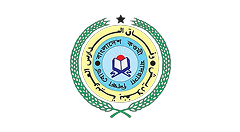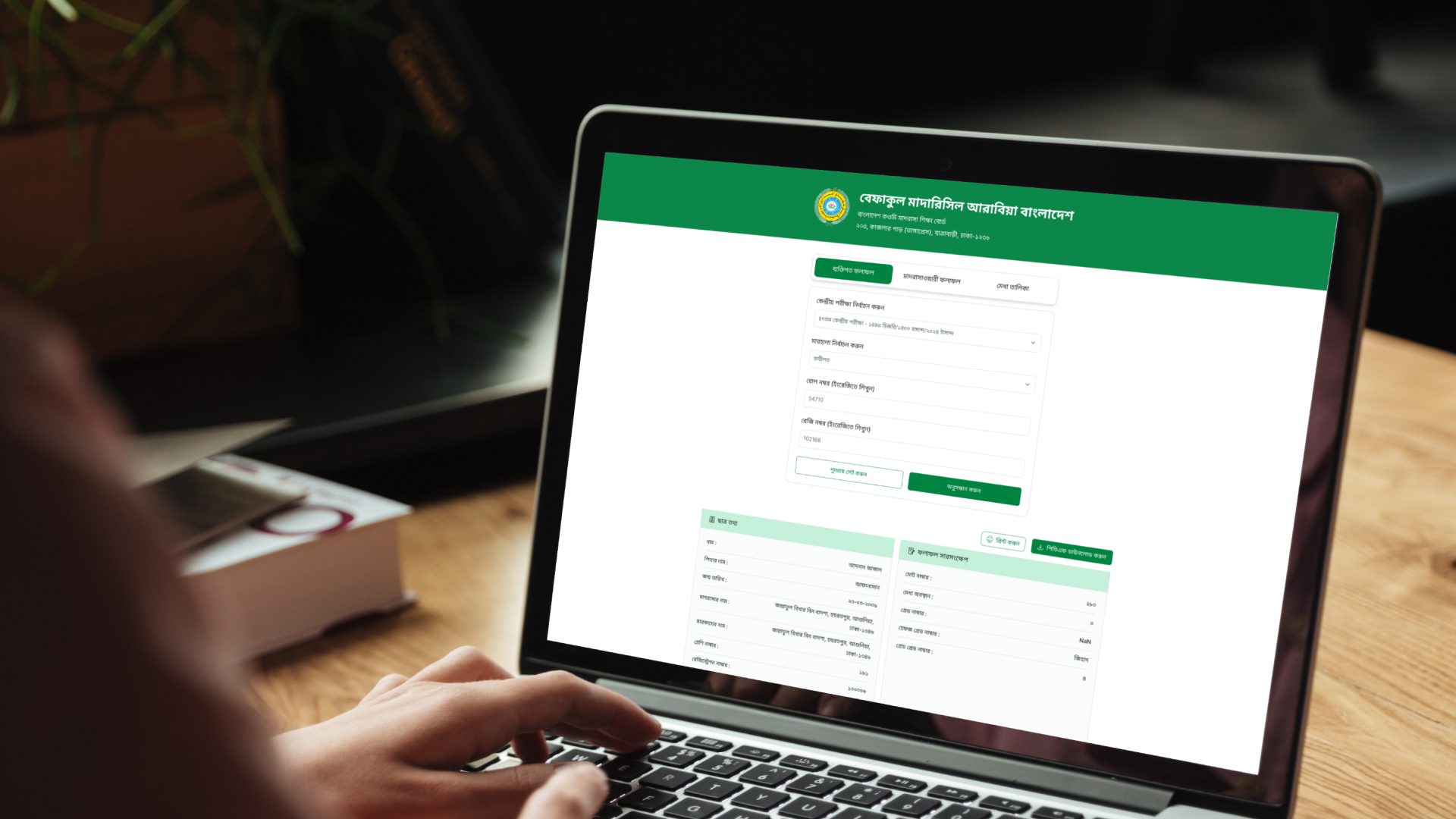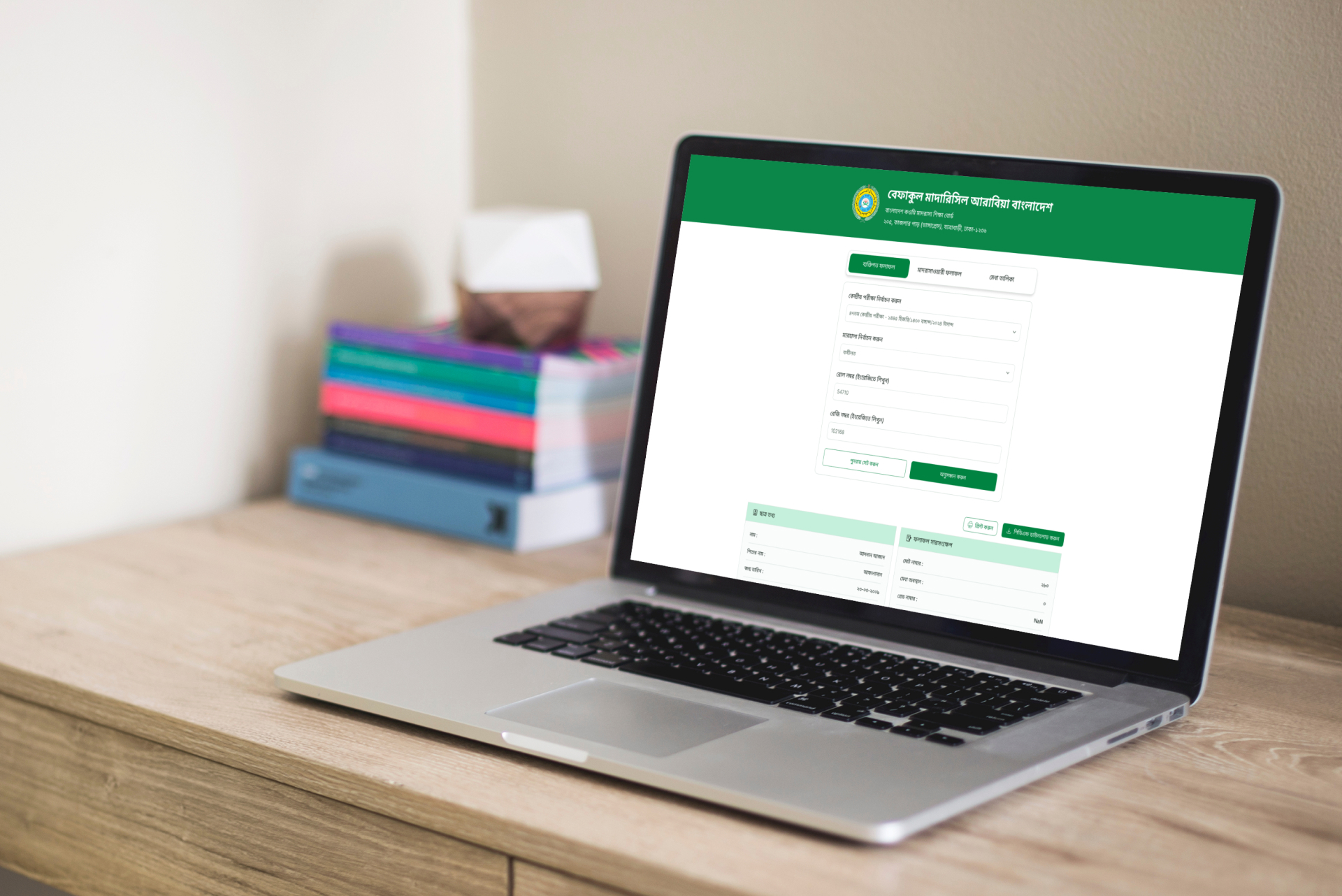Wifaqul | Central Result Publishing System for Qawmi Madrasas
Wifaqul
Wifaqul Madarisil Arabia Bangladesh (Wifaq), founded in 1978, is the largest Qawmi madrasa board in Bangladesh, regulating 30K+ Qawmi madrasas. It unites thousands of Islamic institutions, conducts national exams, and publishes results for male and female students. Dedicated to preserving Islamic teachings, Wifaqul shapes curricula and ensures quality religious education for hundreds of thousands of students nationwide.

Challenges
Wifaqul exam result system faced major issues: site crashes from high traffic, poor usability, not being mobile-friendly, and security flaws resulting in early result leaks and no access controls. With no result archive, weak performance, and slow database queries, the platform was not seamless for both end users and admins. A secure, scalable, and user-friendly upgrade was urgently needed to restore trust.
Solution
Polygon Technology built a result publishing platform for Wifaqul, keeping speed, security, and Scalability in mind. Using Kubernetes, Redis caching, CDNs, and async processing, it now handles millions of students smoothly. It is capable of managing 20K+ TPS and auto-scales at the hit of the threshold. A mobile-first, simple UI helps non-technical users, while secure APIs, time-gated publishing, and role-based access protect data. Added features like audit logs and archives made it fast, safe, and reliable.

Features
Scalable Infrastructure with Kubernetes
Implemented container orchestration via Kubernetes to dynamically allocate resources during traffic spikes, especially during result publishing periods.
Security Enhancements
Enforced HTTPS, added firewalls, and rate limiting to defend against DDoS attacks. Integrated Cloudflare for added protection.
Optimized Database Queries
Refactored slow SQL queries and added indexing for key tables to improve database performance and reduce page latency.
Real-Time Access Control for Results
Introduced token-based API authentication and time-gated result publishing to prevent premature access via links or scripts.
Content Delivery Network (CDN)
Integrated a global CDN to serve static assets (e.g., result PDFs, stylesheets) quickly and reliably across geographies, reducing server stress.
Advanced Caching with Redis
Used Redis to cache frequently requested result data, improving load times and reducing database queries during peak hours.
Asynchronous Result Handling
Adopted Celery queues for background processing, enabling pre-fetching of results and smooth, non-blocking user interactions.
Mobile-First, Responsive Design
Redesigned the UI with mobile-first principles, ensuring full responsiveness and usability across smartphones, tablets, and desktops.
Clean, Intuitive UI/UX
Introduced a minimal interface with a prominent search bar, clear result instructions, and clutter-free navigation tailored for non-technical users.
Result Archive System
Built a historical archive feature that allows users to search and access past years’ results, enhancing platform longevity and user trust.
Role-Based Access Control (RBAC)
Implemented secure RBAC allowing super admins, editors, and viewers to operate within permission boundaries to protect sensitive data.
Audit Trail for Admin Actions
Integrated an audit log to track critical administrative activities—like publishing results or modifying settings—for transparency and accountability.
Scalable Infrastructure with Kubernetes
Implemented container orchestration via Kubernetes to dynamically allocate resources during traffic spikes, especially during result publishing periods.
Security Enhancements
Enforced HTTPS, added firewalls, and rate limiting to defend against DDoS attacks. Integrated Cloudflare for added protection.
Optimized Database Queries
Refactored slow SQL queries and added indexing for key tables to improve database performance and reduce page latency.
Real-Time Access Control for Results
Introduced token-based API authentication and time-gated result publishing to prevent premature access via links or scripts.
Content Delivery Network (CDN)
Integrated a global CDN to serve static assets (e.g., result PDFs, stylesheets) quickly and reliably across geographies, reducing server stress.
Advanced Caching with Redis
Used Redis to cache frequently requested result data, improving load times and reducing database queries during peak hours.
Asynchronous Result Handling
Adopted Celery queues for background processing, enabling pre-fetching of results and smooth, non-blocking user interactions.
Mobile-First, Responsive Design
Redesigned the UI with mobile-first principles, ensuring full responsiveness and usability across smartphones, tablets, and desktops.
Clean, Intuitive UI/UX
Introduced a minimal interface with a prominent search bar, clear result instructions, and clutter-free navigation tailored for non-technical users.
Result Archive System
Built a historical archive feature that allows users to search and access past years’ results, enhancing platform longevity and user trust.
Role-Based Access Control (RBAC)
Implemented secure RBAC allowing super admins, editors, and viewers to operate within permission boundaries to protect sensitive data.
Audit Trail for Admin Actions
Integrated an audit log to track critical administrative activities—like publishing results or modifying settings—for transparency and accountability.
Scalable Infrastructure with Kubernetes
Implemented container orchestration via Kubernetes to dynamically allocate resources during traffic spikes, especially during result publishing periods.
Security Enhancements
Enforced HTTPS, added firewalls, and rate limiting to defend against DDoS attacks. Integrated Cloudflare for added protection.
Optimized Database Queries
Refactored slow SQL queries and added indexing for key tables to improve database performance and reduce page latency.
Real-Time Access Control for Results
Introduced token-based API authentication and time-gated result publishing to prevent premature access via links or scripts.
Content Delivery Network (CDN)
Integrated a global CDN to serve static assets (e.g., result PDFs, stylesheets) quickly and reliably across geographies, reducing server stress.
Advanced Caching with Redis
Used Redis to cache frequently requested result data, improving load times and reducing database queries during peak hours.
Asynchronous Result Handling
Adopted Celery queues for background processing, enabling pre-fetching of results and smooth, non-blocking user interactions.
Mobile-First, Responsive Design
Redesigned the UI with mobile-first principles, ensuring full responsiveness and usability across smartphones, tablets, and desktops.
Clean, Intuitive UI/UX
Introduced a minimal interface with a prominent search bar, clear result instructions, and clutter-free navigation tailored for non-technical users.
Result Archive System
Built a historical archive feature that allows users to search and access past years’ results, enhancing platform longevity and user trust.
Role-Based Access Control (RBAC)
Implemented secure RBAC allowing super admins, editors, and viewers to operate within permission boundaries to protect sensitive data.
Audit Trail for Admin Actions
Integrated an audit log to track critical administrative activities—like publishing results or modifying settings—for transparency and accountability.
- Online Payment
- Lab Order
- Appointment
Cancelling
Additional Features
The platform provides seamless management of appointments, enabling users to easily schedule, reschedule, or cancel their bookings. It also supports secure online payments for consultations and services, streamlining the transaction process. Additionally, patients can conveniently order lab tests directly through the system, simplifying their healthcare experience.
Additional Features
The platform provides seamless management of appointments, enabling users to easily schedule, reschedule, or cancel their bookings. It also supports secure online payments for consultations and services, streamlining the transaction process. Additionally, patients can conveniently order lab tests directly through the system, simplifying their healthcare experience.
Tech Stack






The Impact
The new platform significantly enhanced Wifaqul's digital capabilities. It seamlessly managed over 4 million requests, reduced page load times by 60%, and quadrupled server performance. Mobile usability greatly improved, and advanced security features strengthened administrative oversight. Above all, the platform successfully facilitated a seamless result publishing experience for Wifaqul.
The Impact
Polygon Technology’s robust payment gateway transformed Paperless Limited’s fintech vision into reality, enabling a seamless launch in Bangladesh’s digital payment landscape. By integrating advanced features like QR-based payments, recurring billing, and secure bank gateway management, the solution boosted operational efficiency, merchant trust, and consumer convenience. Leveraging a powerful tech stack—Java, PostgreSQL, React, Laravel, and Flutter—Polygon delivered a scalable, secure platform, empowering Paperless to lead the cashless revolution with confidence and excellence on February 25, 2025.
Håb (ハブ)
“Polygontech is helping startups like Håb to grow faster. With their supervision in product and expert engineers, our business growth accelerates at an outstanding level.”
Yohey Toyoda
Founder & CEO, Håb (ハブ)
Håb (ハブ)
“Polygontech is helping startups like Håb to grow faster. With their supervision in product and expert engineers, our business growth accelerates at an outstanding level.”
Yohey Toyoda
Founder & CEO, Håb (ハブ)
Solutions
we provide
With every single one of our clients we bring forth a deep passion for creative problem solving, innovations, forward thinking and proactive support to ensure the best possible service.
Build Your Tech Team
Build Your Tech Team Are you trying to build your tech team, ...
Software Maintenance Service
Software Maintenance Service Ensure the longevity and optimal performance of your software. ...
UI UX Design Service
UI UX Design Service Unlock the potential of your product with UI ...
Software Development Service
Software Development Service Accelerate disruption both within your organizations and industries. Bring ...
IT Staff Augmentation Service
IT Staff Augmentation Service Get Word Class Tech Talents From All Tech ...
